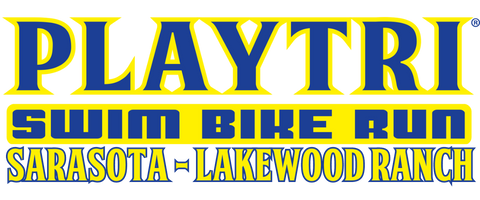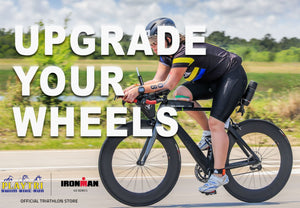
RACING IRONMAN: TIPS FROM THE PLAYTRI COACHES
Whether you’re racing IRONMAN for the first time, or it’s your first attempt at the 140.6, these tips will hold you in good stead.
Start figuring out nutrition and hydration at least 3-4 months in advance
This is a process that can take a lot of time and testing. Figuring out how much your body needs and the best way to get it in looks different for every athlete. Test, assess, adjust and test again!
Test on course nutrition products
If on course product is listed on the race website, get your hands on some and try it in training so you know what you can (and can’t) grab if your plan goes sideways.
Learn how to pump your tires and safety check your bike
Race day mechanics are not there to perform basic maintenance on your bike, so make sure you know how to air up your own tires and check that your bike is safe to ride on race morning. If something isn’t working as normal - then it’s time to ask for help.
Learn how to change a flat
There is always race support on the bike course, but depending on how many athletes have mechanical issues athletes may have to wait an hour or longer for assistance to arrive. Knowing how to quickly change a tube (and having the tools to do it) will lower your stress on race day.
Test drive all your gear, then test it again
Try everything before race day. No complaining if you use something new and it backfires!
Make a mental “map” of your race
Review the course and choose specific execution goals for each event based on your skill, fitness, goals and the demands of the course. Then choose a key word or phrase for each event to keep you focused on performing your best. Practice using these in training.
Make a pre-race itinerary
Map out the days leading up to your event to ensure you check all of your pre-race boxes, and reduce stress. Include times and locations for all planned activities.
Read the athlete guide
Really - there’s some important info in there. Race day schedule details, pre-race check in guidelines, rules, and lots more. IRONMAN events generally have 1000+ athletes participating, so there is very little leeway for adjustments/exceptions on race weekend - reading the athlete guide can help you avoid missing crucial deadlines, course information and rule updates.
Race day hydration and carb loading starts a week before the race
Start hydration intentionally and having a few more grams of carbs each day starting about 5-7 days prior to the race. Pre-race pasta dinners will only weigh you down, and hydration doesn’t happen in a day!
Bring extra goggles and anti-fog
Broken or foggy goggles on race day can create unnecessary stress and challenges. Bring at least two additional pairs (bonus points if they give you different options for tints, mirroring, etc.) and an anti-fog solution that you can apply if needed.
Don’t forget the sunscreen and glide
A guidelines that requires no additional explanation. You know what the consequences are.
Minimize time at expo
Athletes can easily spend hours wandering the expo on race weekend. Most race expos are outdoors, meaning athletes are on their feet in the sun during this time - not a great recipe for feeling fresh on race day. Try to combine necessary activities - packet pickup, pre-race meeting, bike check-in, etc. - to reduce total time out in the elements.
Bring your recovery tools and use them
If you love to use your foam roller/compression boots/massage gun/etc. before competitions or long training sessions - bring it! Work time into your pre-race itinerary for these activities.
Know your heart rate zones - trust them
Heart rate on race day can let you know if you’re making smart choices before your body lets you know more forcefully. Heart rate doesn’t lie - know your zones and stay where it’s sustainable.
Make conservative choices early, take risks at the end
Everyone feels good at the beginning of the race. Stick to the plan and take risks when you get closer to the end - it will pay off when you pass everyone who wasn’t as smart at the beginning!
The solution to every problem is to slow down
It’s tough but true. If you’ve exhausted every other possible solution, suck it up and pull back the pace until heart rate and feel recover.
Remember to smile - you paid to be here
If you’re not having any fun, you’re doing it wrong. Remember you paid for this long day, and enjoy pushing the limits of what your body is capable of - and perhaps discovering something new.
Questions? Reach out to one of our contributing coaches:
Jim Rowe - jim.rowe@playtri.com
Ryan Siebert - ryan.siebert@playtri.com
Callie Guenther - callie.guenther@playtri.com



Leave a comment